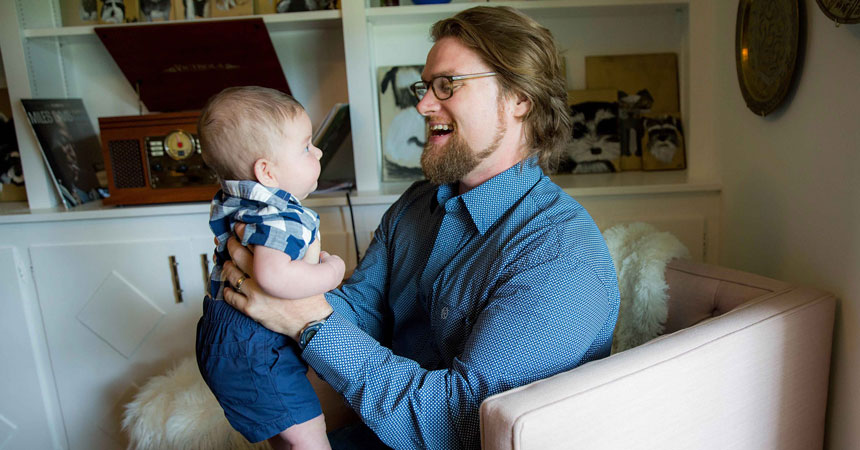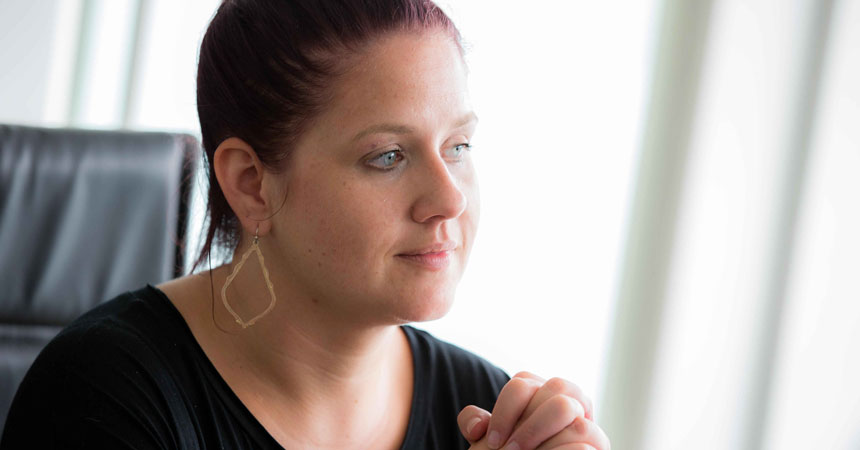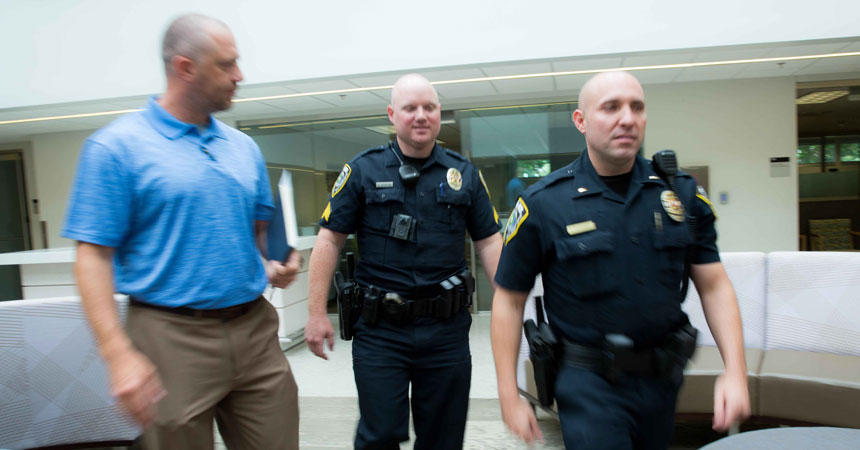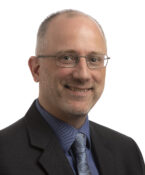Mental health in grad school
By Jan Jarvis

The thoughts whispering at Anna Black never took a rest – ever. They followed her through junior high, then into college.
“I believed I had to be perfect in everything I did,” she said. “Getting a 95 was unacceptable.”
For a while, she was able to manage her thoughts. Then she started her first year at the Texas College of Osteopathic Medicine and felt overwhelmed.
“I was not sleeping or eating at all,” Black said. “I was trying to keep up with everything, but I just couldn’t. It got to the point where all I did was think about how I needed to be perfect if I was going to be taking care of patients one day.”
Her weight plunged. She withdrew. No matter how hard she tried, Black could not outrun the thoughts churning in her brain. When thoughts of killing herself crowded out the voices telling her to be perfect, Black fell into a deep despair.
The Care Team was ready to catch her.
Pressure cooker
More than 25 percent of medical students nationwide report symptoms of depression, according to a study in the Journal of the American Medical Association. About 10 percent of all medical school students report having thoughts of suicide.
In 2012, the Care Team was established at UNT Health Science Center following a student’s suicide. The interdisciplinary Care Team supports students and connects them with the appropriate resources.
“That’s why this job exists,” said Emily Mire, PhD, Director for Wellness Services and Chair of the Care Team. “What I am doing professionally is because of a tragedy.”
Students are referred or seek help on their own for all kinds of reasons. For some, it is depression brought on by financial worries, loneliness and stress. For others, a life crisis – such as the death of a parent, a divorce, or illness – leads to despair.
Some students struggle to meet basic needs, like finding a place to live and food to eat. The Food Pantry, for example, was launched in 2016 after some students lost everything in an apartment fire.
In addition, the Care Team works with International Services to address the unique needs of students from foreign countries.
“We keep up with what’s happening in other countries and how our international students are affected by travel bans, elections and other issues,” Dr. Mire said. “When students are separated from members of their family, it be can very stressful.”
For many it’s an unrelenting pressure to succeed that triggers the greatest despair. After cruising through college, they find themselves facing a blast furnace of facts that must be memorized. Competition, criticism and confusion combine with sleep deprivation, poor diet and isolation. It’s a recipe for hopelessness.
Black said she was close to suicide when the Care Team stepped in to guide her to a better place. That meant taking leave, entering inpatient treatment and spending the next year getting strong enough to start medical school again.
“Nobody quits med school,” she said. “But I also felt like that was the only option. I knew I’d come back stronger and be better for having done it.”
Challenging years
Mary Jackson’s breaking point came a few weeks into anatomy lab.
“I was peeling off the skin from a man’s face and started crying,” she said. “All of a sudden I realized I wasn’t just looking at a body. I was looking at a man with blue eyes.”
Seeing the donor body as someone’s husband, son or father was enough to rattle Jackson’s confidence as a first-year TCOM student. What jarred her even more was the realization that she might be jeopardizing a future she had been working for since high school.
“I was doing exactly what I always wanted to do,” she said. “But now all of a sudden I’m wondering if I even belonged in medical school.”
The first and third years of medical school are peak times for referrals. Both are transitional years when students must adjust to big changes, Dr. Mire said.
Although students can refer classmates anonymously, many hesitate to do so. More often, a faculty member observes that a student is missing classes or appears withdrawn. The team meets weekly to discuss students who have been referred for help.
When students fail to respond to phone calls, welfare checks are performed by the team with help from the UNTHSC Police, said Chris Klein, Assistant Director of Wellness Services. Officers respond quickly, whether it is during the day, night or weekends.
“Because of them, we’re going to come right away and make sure a student is okay,” said Klein, a former Dallas police officer.
Chris Douglas turned to the Care Team when he faced a major test along with a double dose of family stress: his father was diagnosed with cancer and Douglas’ wife was expecting a baby. The Care Team provided emotional support and got the test moved up a day so he could be there for the birth of his son.
“I was a wreck,” Douglas said. “In the back of my mind I kept thinking about the test, but also my dad and baby.”

Marie MacDonald knew that as a single mother with two boys, going to school would be tough.
“But I thrive under challenges,” she said. “I felt like there was never a good time to go to school – I just had to make it happen.”
When her nanny quit and her son stopped talking, MacDonald thought she would have to leave the physical therapy program in UNTHSC’s School of Health Professions. Although she was reluctant to ask for help, MacDonald finally contacted the Care Team.
“They listened to me for almost two hours and just let me vent it all out,” she said.
More InformationContact the Care Team at 817-735-2740 or by email at careteam@unthsc.edu. |
The team delivered emotional support and helped MacDonald find ways to juggle childcare and school.
In Jackson’s case, she says the Care Team kept her going through her first year. Then, in her second year of medical school, Jackson’s mother was diagnosed with ovarian cancer. Between studying for the boards and taking her mother to chemotherapy, Jackson felt as if she would not be able to finish school.
“I didn’t want to quit, but I needed a breather,” she said. “The Care Team never stopped checking on me. Without them, I probably would have failed my first year or I would have quit and had to start over.
“I credit Emily and the Care Team for being the reason why I am going to graduate.”
***
For privacy reasons, the names of some students have been changed at their request







Social media